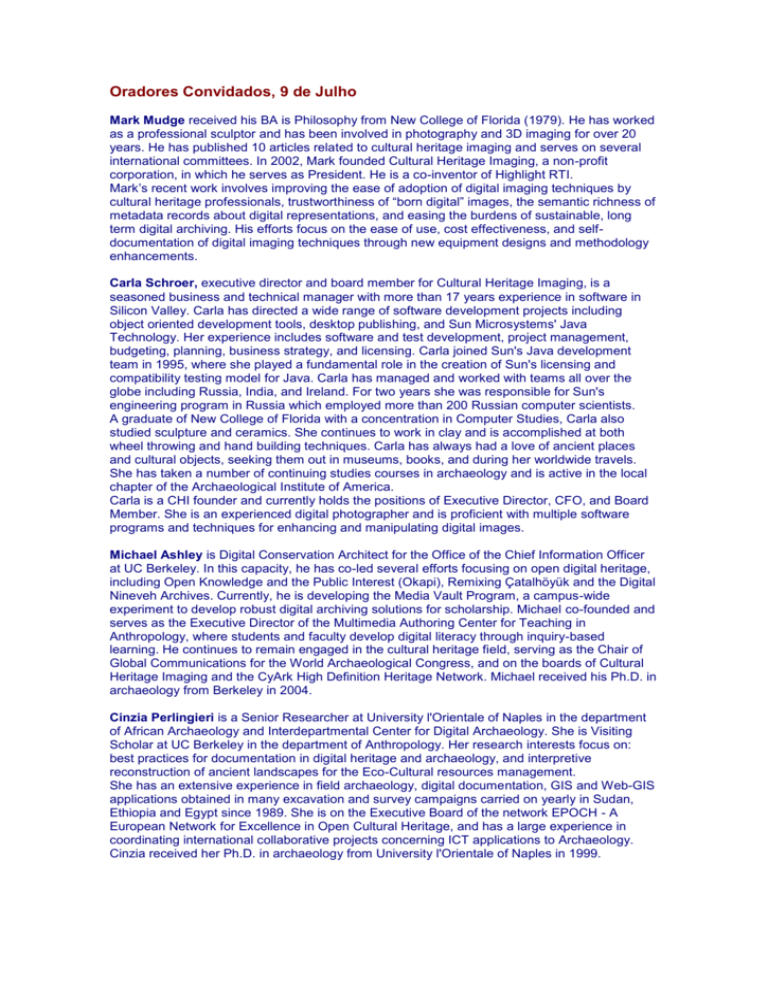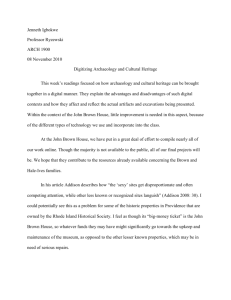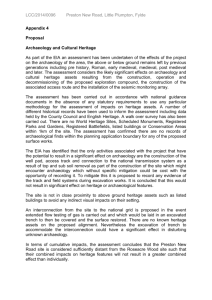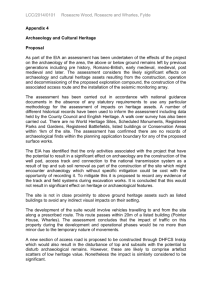Oradores Convidados, 9 de Julho
advertisement

Oradores Convidados, 9 de Julho Mark Mudge received his BA is Philosophy from New College of Florida (1979). He has worked as a professional sculptor and has been involved in photography and 3D imaging for over 20 years. He has published 10 articles related to cultural heritage imaging and serves on several international committees. In 2002, Mark founded Cultural Heritage Imaging, a non-profit corporation, in which he serves as President. He is a co-inventor of Highlight RTI. Mark’s recent work involves improving the ease of adoption of digital imaging techniques by cultural heritage professionals, trustworthiness of “born digital” images, the semantic richness of metadata records about digital representations, and easing the burdens of sustainable, long term digital archiving. His efforts focus on the ease of use, cost effectiveness, and selfdocumentation of digital imaging techniques through new equipment designs and methodology enhancements. Carla Schroer, executive director and board member for Cultural Heritage Imaging, is a seasoned business and technical manager with more than 17 years experience in software in Silicon Valley. Carla has directed a wide range of software development projects including object oriented development tools, desktop publishing, and Sun Microsystems' Java Technology. Her experience includes software and test development, project management, budgeting, planning, business strategy, and licensing. Carla joined Sun's Java development team in 1995, where she played a fundamental role in the creation of Sun's licensing and compatibility testing model for Java. Carla has managed and worked with teams all over the globe including Russia, India, and Ireland. For two years she was responsible for Sun's engineering program in Russia which employed more than 200 Russian computer scientists. A graduate of New College of Florida with a concentration in Computer Studies, Carla also studied sculpture and ceramics. She continues to work in clay and is accomplished at both wheel throwing and hand building techniques. Carla has always had a love of ancient places and cultural objects, seeking them out in museums, books, and during her worldwide travels. She has taken a number of continuing studies courses in archaeology and is active in the local chapter of the Archaeological Institute of America. Carla is a CHI founder and currently holds the positions of Executive Director, CFO, and Board Member. She is an experienced digital photographer and is proficient with multiple software programs and techniques for enhancing and manipulating digital images. Michael Ashley is Digital Conservation Architect for the Office of the Chief Information Officer at UC Berkeley. In this capacity, he has co-led several efforts focusing on open digital heritage, including Open Knowledge and the Public Interest (Okapi), Remixing Çatalhöyük and the Digital Nineveh Archives. Currently, he is developing the Media Vault Program, a campus-wide experiment to develop robust digital archiving solutions for scholarship. Michael co-founded and serves as the Executive Director of the Multimedia Authoring Center for Teaching in Anthropology, where students and faculty develop digital literacy through inquiry-based learning. He continues to remain engaged in the cultural heritage field, serving as the Chair of Global Communications for the World Archaeological Congress, and on the boards of Cultural Heritage Imaging and the CyArk High Definition Heritage Network. Michael received his Ph.D. in archaeology from Berkeley in 2004. Cinzia Perlingieri is a Senior Researcher at University l'Orientale of Naples in the department of African Archaeology and Interdepartmental Center for Digital Archaeology. She is Visiting Scholar at UC Berkeley in the department of Anthropology. Her research interests focus on: best practices for documentation in digital heritage and archaeology, and interpretive reconstruction of ancient landscapes for the Eco-Cultural resources management. She has an extensive experience in field archaeology, digital documentation, GIS and Web-GIS applications obtained in many excavation and survey campaigns carried on yearly in Sudan, Ethiopia and Egypt since 1989. She is on the Executive Board of the network EPOCH - A European Network for Excellence in Open Cultural Heritage, and has a large experience in coordinating international collaborative projects concerning ICT applications to Archaeology. Cinzia received her Ph.D. in archaeology from University l'Orientale of Naples in 1999.








